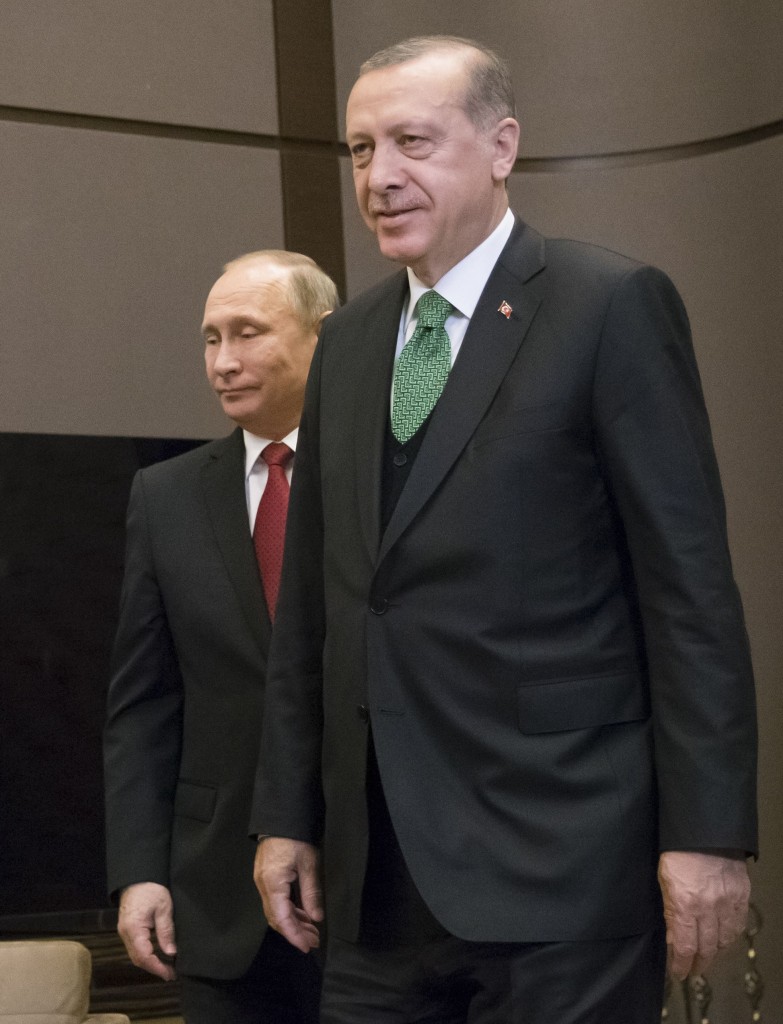Analysis
Erdogan, Putin and realpolitik
At their meeting in Sochi, the Russian and Turkish heads of state could hardly ignore their differences on Syria, the PKK and commercial tariffs. They could, however, set them aside.

Recep Tayyip Erdogan and Vladimir Putin may not particularly like each other, but they know they have common interests. Thus, relations between Turkey and Russia are moving laboriously back on their feet after the incident in November 2015, when a Russian bomber was shot down by Turkish anti-aircraft artillery on the Syrian border.
Regular communications between the two countries restarted last summer, when the Turkish President made a 180-degree turn and found the strength to apologize for shooting down the Russian aircraft and re-launched relations with Moscow.
On Wednesday, the leaders met in Sochi for a three-hour meeting. Putin has felt the need to smooth Erdogan’s hair and congratulated him once again for “his success in the referendum … which will facilitate the relations between our countries even more.” A note appreciated by his Turkish counterpart, who is trying to give international dignity to a vote that much of the world considered an undemocratic plebiscite.
Moreover, the two presidents have always shown little interest in the appeals for the preservation of democratic and civil rights. They prefer a pragmatic foreign policy able to flex its muscles when needed and based on non-interference in the internal affairs of other countries, especially when it comes to Armenia, minority rights and democratic freedoms.
Putin, in affirming the need for a solution to the Syrian conflict, has borrowed an old Russian proverb: “When you have a pain, talk about it,” thus signaling the need to keep an open dialogue with Turkey on the issue, even though they hold very different points of view about the Kurdish situation.
Foreign Minister Lavrov spoke, on behalf of Russia, during an interview on Tuesday to Ria Novosti. He said Russia intends to continue to have good relations with Ocalan’s Kurdish nationalist movement “in order to prevent the United States from hegemonizing it.”
Erdogan already knew about this position. Even on the still hot topic of the bombing with chemical weapons a few weeks ago, their positions are different. However, despite the fact the two countries have different beliefs on who is responsible for the massacre, Erdogan stressed that in his conversation with the Russian president, they reached a common position: “Such a barbaric attack must not go unpunished, and today I agreed with Mr. Putin that those responsible must answer.”
However, much of the conversation between the two presidents was devoted to economic and commercial tied. After the resumption of relations, so resumed the flow of low-cost Russian flights to Turkish resorts, which are particularly popular destinations because they are just a few flying hours from Moscow. It is quite a large business: In 2015, over three million Russian tourists visited Turkey.
The two countries also have maintained for years an intense commercial trade in textiles, semi-finished metals and agricultural products. In this sector, however, there are ongoing difficulties. While Erdogan railed again for “the abolition of all customs barriers” during his press conference, the Russian president hesitated.
Russia intends to keep duty charges on some agricultural products, like tomatoes. The head of the Kremlin replied: “When the investment we made has achieved its cycle, we will also liberalize this sector.”
Last but not least, the two heads of state discussed the energy issue. Turkey already buys more than half of its natural gas needs, 50 billion cubic meters, from Russia. Before the diplomatic crisis, the two countries had begun the works on the Turkstream project, a pipeline through the Black Sea that would provide an additional 30 billion cubic meters of Russian gas to Turkey.
Wednesday, the two leaders have taken the project over: Ankara is hungry for energy and Moscow is eager to settle the pipelines that cross Ukraine.
Originally published at https://ilmanifesto.it/erdogan-putin-e-la-realpolitik-il-gasdotto-val-bene-il-compromesso/ on 2017-05-04
